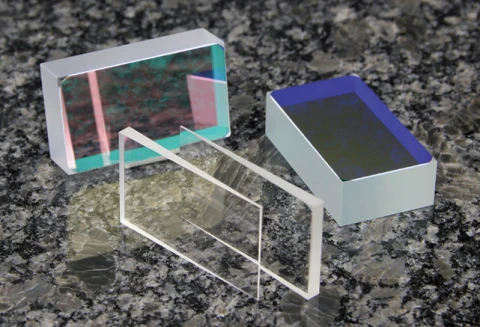Glass Wedges for Dispersion Fine Tuning
Description
The glass wedge pairs are designed for precise dispersion tuning and optimal pulse compression when used in conjunction with dispersion compensating mirrors (DCM). These mirrors are engineered with specific dispersion characteristics to complement certain glass materials, allowing the wedge pair to fine-tune dispersion and effectively compress pulses for the intended application.
Glass Wedges for Dispersion Fine Tuning
Specifications |
|
|---|---|
| Materials: | Calcium Fluoride, Fused Silica |
| Center Thickness (Calcium Fluoride): | 14 mm |
| Center Thickness (Fused Silica): | 1.4mm, 2.0mm |
| Wedge Angle (Calcium Fluoride And Fused Silica)): | 4 deg |
| Surface Quality (Calcium Fluoride): | < lambda/6, S/D<60-40 |
| Surface Quality (Fused Silica): | < lambda/10, < lambda/4 |
| Bandwidth: | 300 - 1500 nm, uncoated for use under Brewster angle |
| For Use With (Calcium Fluoride): | DCM7 |
| For Use With (fUSED SILICA): | DCM9, DCM10, DCM12 |
Features
- Material Options: Available in Calcium Fluoride (CaF₂) and Fused Silica, providing high optical transmission and excellent performance across a broad wavelength range.
- Center Thickness: Available in center thicknesses of 1.4 mm, 2.0 mm, and 14 mm, offering flexibility for various applications and ensuring precise control of dispersion.
- Dimensions: Offered in different sizes: 35 x 20 mm for smaller setups, 50 x 25 mm for larger systems, providing versatile configurations to suit different optical systems.
- Wedge Angle: Each wedge pair features a 4° wedge angle, ideal for fine dispersion control in pulse compression setups.
- Surface Quality: The wedges exhibit exceptional surface quality: < λ/6 surface flatness for minimal optical distortion. S/D < 60-40 (Calcium Fluoride) and < λ/10 (Fused Silica) ensuring high precision and minimal scattering.
- Broadband Compatibility: These wedges cover a wide bandwidth from 300 nm to 1500 nm, making them suitable for a variety of laser systems and applications.
- Uncoated for Brewster Angle Use: The wedges are uncoated, ideal for use under Brewster’s angle to minimize reflection losses in high-precision systems.
- Compatibility with DCMs: Designed for use with DCM7, DCM9, DCM10, and DCM12 dispersion compensating mirrors, ensuring seamless integration and optimal performance in dispersion compensation setups.
Applications
- Pulse Compression: These glass wedges are perfect for fine-tuning dispersion in pulse compression systems, enabling sharper, more efficient pulse delivery in laser systems.
- Laser Dispersion Compensation: Ideal for use in high-power laser systems where dispersion compensation is critical, especially in setups with DCM mirrors.
- Optical Parametric Amplification (OPA): Used in OPA systems to help manage dispersion and optimize the temporal characteristics of the output pulses.
- Ultrafast Laser Systems: These wedges are excellent for femtosecond and picosecond laser systems, where precise dispersion tuning is essential to maintaining pulse integrity and quality.
- Spectroscopy: Useful in spectroscopic applications where dispersion tuning is needed to optimize the wavelength range and improve measurement accuracy.
- High-Precision Metrology: Employed in optical metrology systems that require high precision for measurements of time, wavelength, and phase, ensuring the pulse shapes remain consistent.
For pricing, technical or any other questions please contact the supplier
- No registration required
- No markups, no fees
- Direct contact with supplier
-
Ships from:
United States
-
Sold by:
-
On FindLight:
since 2016
Frequently Asked Questions
The glass wedges are available in Calcium Fluoride (CaF₂) and Fused Silica, both offering excellent optical properties.
These glass wedges have a 4° wedge angle, suitable for fine-tuning dispersion in pulse compression systems.
The surface quality is < λ/6 for Calcium Fluoride and < λ/10 for Fused Silica, with S/D < 60-40 and S/D < λ/4.
These wedges have a bandwidth range of 300 nm to 1500 nm, making them compatible with a wide variety of laser systems.
The wedges are uncoated, designed for use under Brewster’s angle, minimizing reflection losses in laser systems.

